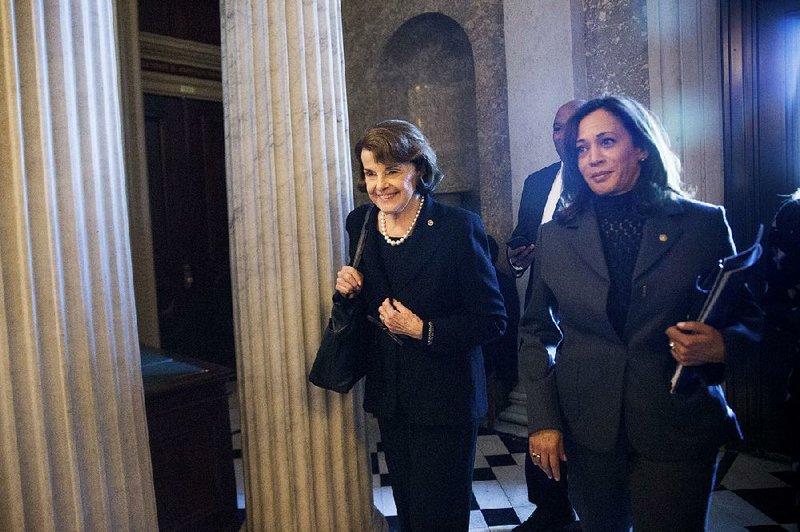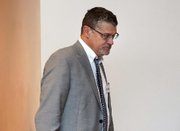WASHINGTON -- The head of the research firm behind a dossier of allegations against then-presidential candidate Donald Trump told congressional investigators that someone inside Trump's network had also provided the FBI with information during the 2016 campaign, according to a transcript released Tuesday.
The claim was quickly disputed by at least one person close to the investigation into Russian interference in the election.
Late Tuesday, Trump's personal attorney Michael Cohen sued Buzzfeed Inc. for defamation over allegations pertaining to him in the dossier. Cohen said he also filed a second defamation suit against Fusion GPS, which compiled the dossier, in federal court. Buzzfeed published the dossier in its entirety nearly a year ago, which it said it obtained from a source it didn't identify.
The dossier contains unverified claims that Cohen and Trump had connections with Russian figures. Most other U.S. news organizations declined to publish the document because many of its claims -- some of them salacious -- haven't been substantiated.
[📄 DOCUMENT: Read the full transcript]
"It will be proven that I had no involvement in this Russian collusion conspiracy," Cohen said in an interview Tuesday. "My name was included only because of my proximity to the president."
Glenn Simpson, a founder of the research firm Fusion GPS, spoke to investigators with the Senate Judiciary Committee for 10 hours in August. As the partisan fight over Russian interference in the 2016 election has intensified, Simpson has urged that his testimony be released, and a copy of the 312-page transcript was made public Tuesday.
It was released by the ranking Democrat on the Senate Judiciary Committee, Sen. Dianne Feinstein of California. That decision marks the most serious break yet in the cooperative relationship she has had with the Republican chairman of the committee, Sen. Charles Grassley, R-Iowa.
A spokesman for Grassley called Feinstein's move "totally confounding" and done without consultation. "Her action undermines the integrity of the committee's oversight work and jeopardizes its ability to secure candid voluntary testimony relating to the independent recollection of future witnesses," said the spokesman, Taylor Foy.
[PRESIDENT TRUMP: Timeline, appointments, executive orders + guide to actions in first year]
Feinstein said she released the transcript to set the record straight.
"The innuendo and misinformation circulating about the transcript are part of a deeply troubling effort to undermine the investigation into potential collusion and obstruction of justice," she said.
A representative for Fusion GPS did not immediately comment.
Fusion GPS was hired in mid-2016 by a lawyer for Hillary Clinton's presidential campaign and the Democratic National Committee to dig into Trump's background. Earlier that year, the firm had been probing Trump for a conservative website funded by a GOP donor, but that client stopped paying for the work after it became clear Trump would win the GOP nomination, according to people familiar with the matter.
After Democrats began paying for the research, Fusion GPS hired Christopher Steele, a former senior officer with Britain's intelligence service, MI6, to gather intelligence about any ties between the Kremlin and Trump and his associates. Steele's reports were eventually compiled into a dossier alleging the Trump campaign coordinated with the Kremlin -- a claim the president has repeatedly denied.
Steele first reached out to the FBI with his concerns in early July 2016, according to people familiar with the matter. When they re-interviewed him in early October, agents made it clear, according to Simpson's testimony released Tuesday, that they believed some of what Steele had told them.
"My understanding was that they believed Chris at this point -- that they believed Chris might be credible because they had other intelligence that indicated the same thing and one of those pieces of intelligence was a human source from inside the Trump organization," Simpson said.
Simpson said he didn't know whether the person was connected to the Trump campaign or a Trump company, adding that his understanding was the source was someone who had volunteered information to the FBI or, in his words, "someone like us who decided to pick up the phone and report something."
One person familiar with the probe said Simpson's comments misrepresent what had actually happened -- that it was an Australian official who reached out to the United States in late July with concerns about a conversation months earlier in London with Trump campaign adviser George Papadopoulos. Papadopoulos has since pleaded guilty to lying to the FBI and is cooperating with investigators.
During Simpson's August interview, a Republican staff member pressed him further on this claim, and Simpson's answers were vague. Steele "would say very generic things like I saw [the FBI], they asked me a lot of questions, sounds like they have another source or they have another source. He wouldn't put words in their mouth," the transcript says.
Arkansas congressman
Simpson, at another point in the interview, is asked whether an email with the subject line "Appointment with Cong. Hill" refers to Rep. French Hill, R-Ark. The email, dated May 13, 2016, was sent to Mark Cymrot by Rinat Akhmetshin.
Simpson responded that he didn't know if "Cong. Hill" refers to the Arkansas congressman.
In July 2017, Hill acknowledged meeting with Akhmetshin and attorney Natalia Veselnitskaya in April 2016. The two were lobbying for changing the name of the Magnitsky Act, which is named after a Russian whistleblower who the U.S. government says was imprisoned and killed.
Akhmetshin is a Russian-American lobbyist who attended a heavily scrutinized meeting in 2016 with top Trump campaign officials, including Donald Trump Jr., at Trump Tower in New York. Veselnitskaya also attended the Trump Tower meeting.
After the U.S. passed the Magnitsky Act in 2012, Russia retaliated by swiftly bringing an end to the adoption of Russian children by Americans. Hill said in July that Akhmetshin and Veselnitskaya "said that if people were willing to change the name of that act that perhaps [U.S.-]Russian adoptions could go forward again."
After the meeting, Hill said, "I took that information and turned it over to the House Foreign Affairs [Committee] staff and the embassy staff in Moscow and let them assess whether it was of any value," he said.
Hill later posted a letter online that was highly critical of Russia.
Late in Simpson's August interview, a lawyer for Fusion GPS, Joshua Levy, asserts that the dossier's publication had led to someone's murder.
"Somebody's already been killed as a result of the publication of this dossier and no harm should come to anybody related to this honest work," Levy said late in the interview, according to the transcript.
Levy did not expand on that claim in the interview, nor is there any public information that would tie a specific killing to information in the dossier. However, a person close to the investigation said Fusion GPS has long worried that Steele's sources could be in danger, given a handful of killings that took place in the months after the dossier's existence became known.
In recent weeks, as the political fights about the Russia investigation and the dossier have intensified, Simpson has urged the committee to release the full transcript of his interview. In an op-ed in The New York Times, Simpson and Peter Fritsch, the firm's co-founders, accused Republicans of concealing their testimony in an effort to smear the dossier and distract from questions about the Trump campaign's ties to Russia.
Through much of 2017, Feinstein and Grassley made joint requests for information about Russia and the FBI's investigation of election interference. In the fall, however, tensions between Grassley and Feinstein spilled out into the open as Grassley requested information from the FBI and other sources without Feinstein's support.
Increasingly, the Democrats and Republicans on the committee are going in different directions -- with Grassley moving to investigate matters involving Clinton when she was secretary of state and Feinstein concentrating on Russian interference in the 2016 election.
After Feinstein released the document, Grassley said that "neither the special counsel, nor any other congressional committee, has released transcripts of private interviews in the course of their investigations." He is referring to special counsel Robert Mueller, who is also investigating the Russian meddling.
Other Republicans on the panel were less concerned. Sen. John Cornyn, R-Texas, told reporters that the release was a "good idea" and that transparency is important as they work to understand the impact of the dossier.
While Simpson has accused conservative lawmakers of acting in bad faith, Republicans have accused Steele, while working for Fusion GPS, of misleading the FBI. Last week, Grassley made a criminal referral to the Justice Department, suggesting Steele may have lied to the FBI.
Simpson told investigators in August that Steele is "basically a Boy Scout," saying he has worked with Steele on and off since 2009 and he knew him to be "a person who delivered quality work in very appropriate ways," according to the transcript.
He also disputed Republican charges that his firm is linked to Democrats, saying the firm takes clients from both sides of the aisle.
Information for this article was contributed by Devlin Barrett and Tom Hamburger of The Washington Post; by Nicholas Fandos of The New York Times; by Mary Clare Jalonick, Eric Tucker, Chad Day, Desmond Butler, Ashraf Khalil and Andrew Taylor of The Associated Press; by Jennifer Jacobs of Bloomberg News; and by Frank Lockwood of the Arkansas Democrat-Gazette.
A Section on 01/10/2018

